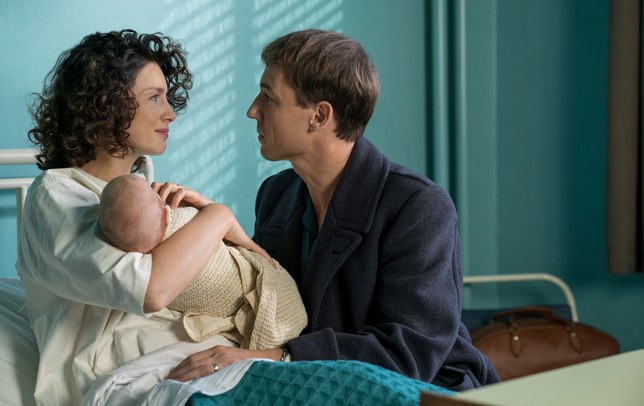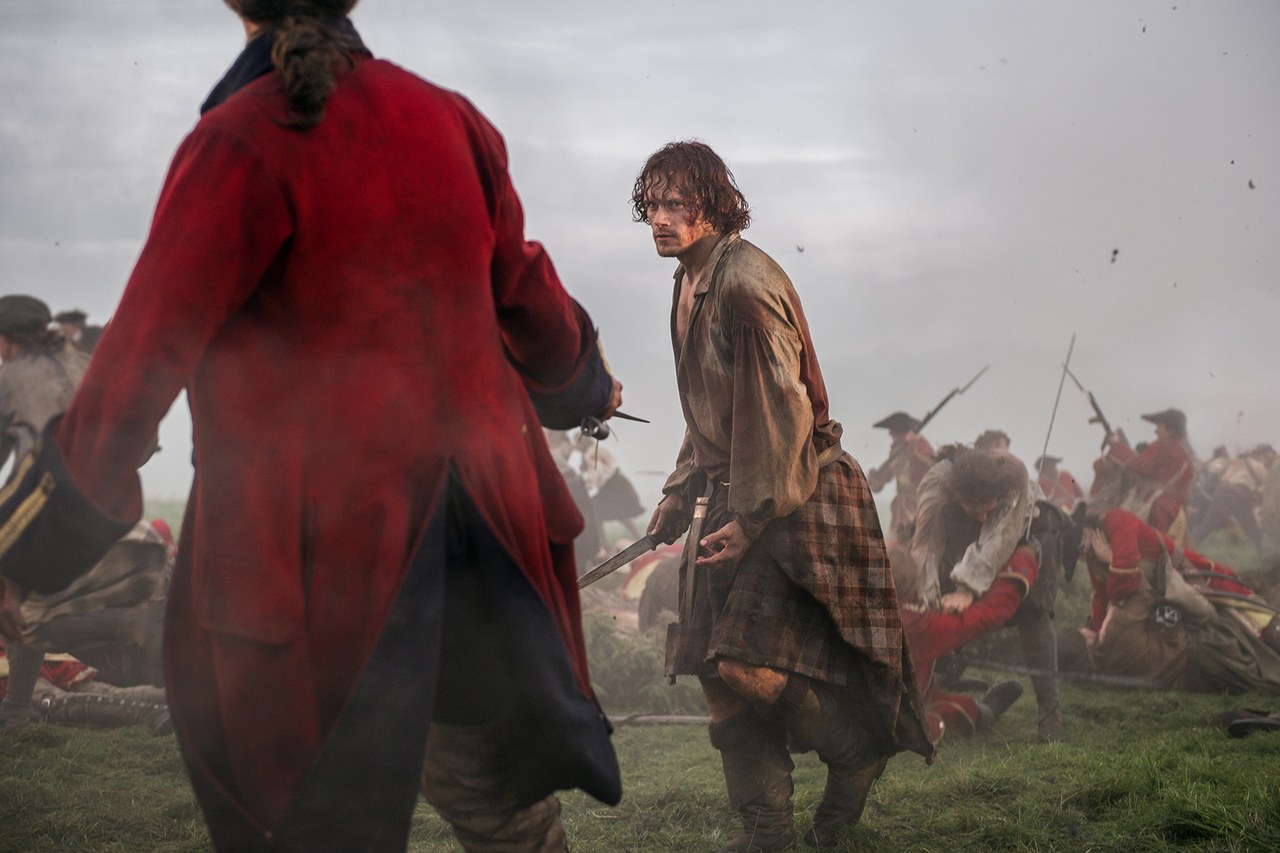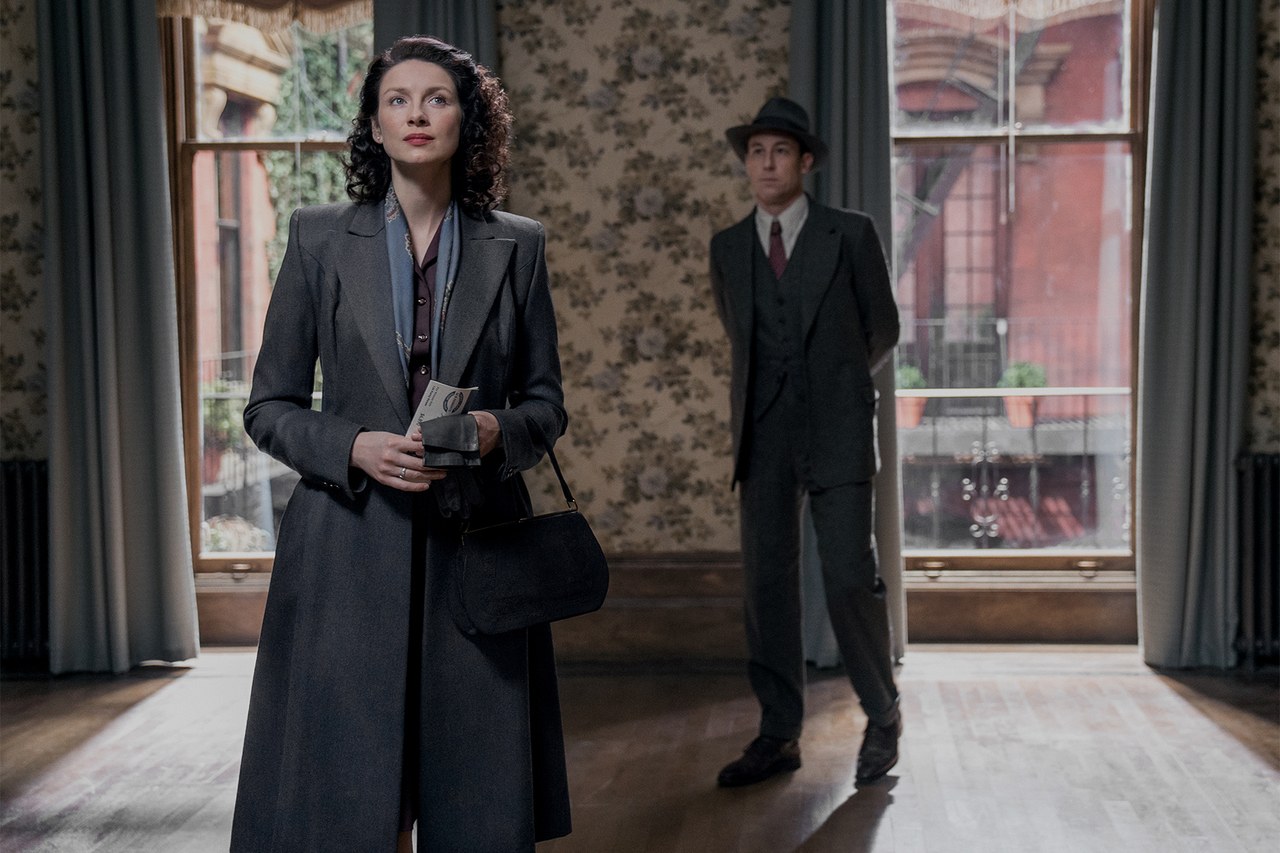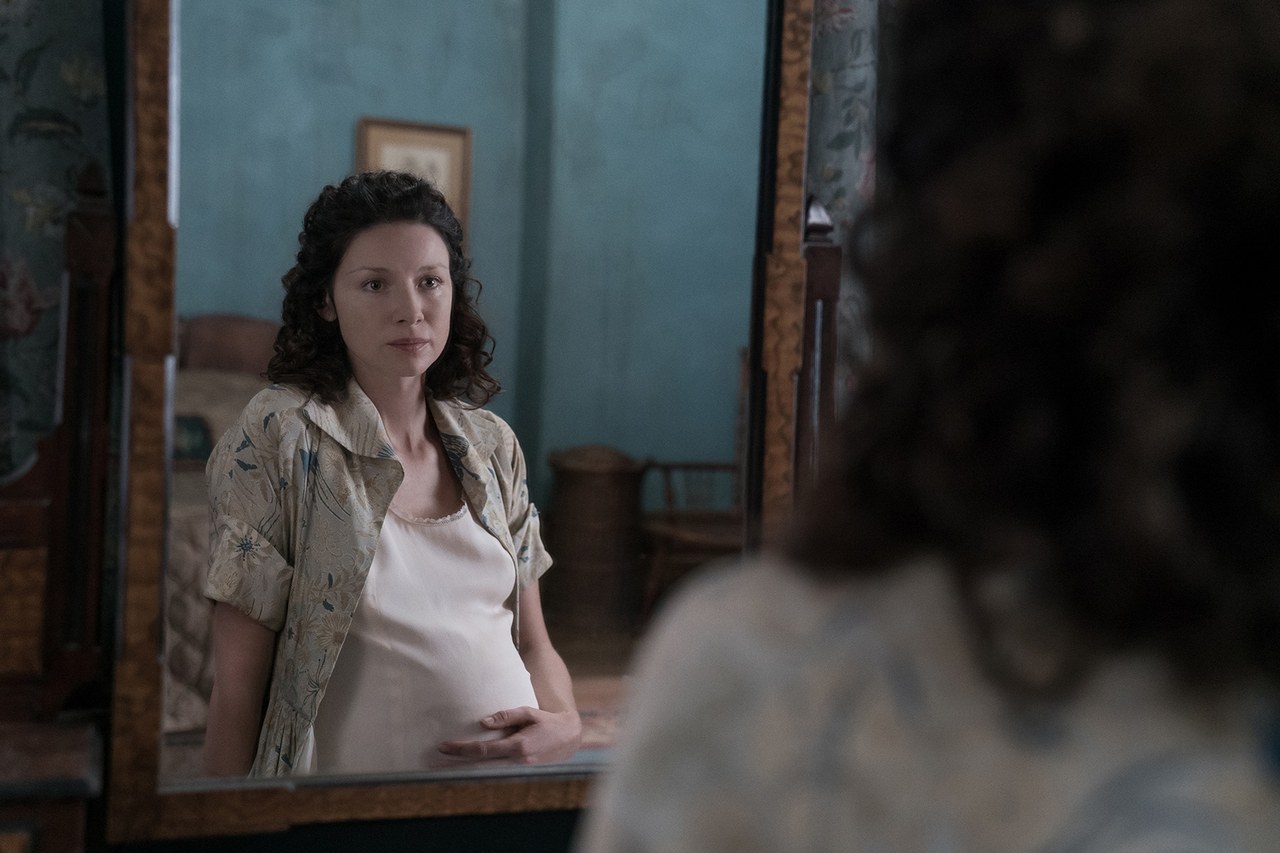‘Outlander’ Premiere Brings New Beginnings for Jamie and Claire—With Mixed Results

The article centers on Season 3, Episode 1 of “Outlander: The Battle Joined.” If you’re not get caught up with the show, be warned: Spoilers abound.
The first season of Outlander made us all believe this was going to be a show about hot sex on the Scottish highlands between time-traveling British nurse Claire Randall and her dashing lover (now husband), Scottish Highland warrior Jamie Fraser. But things took quite the turn when Jamie Fraser ran into the sadism of Black Jack Randall. Throughout the second season, the show’s tone was much darker; there was much more at stake than the tension of whether or not Claire would ever find her way back to her own place and time, or how much sex Claire and Jamie would have. Instead, we were concerned with matters of fate, history, and fortune. We were innocent in the first season, and then we were not. All the while, the show grew wildly in popularity because of the melodrama, the men in kilts, the intricate plots, the historical imagination, the exceptional production values—but mostly the sex, because for once, we have a show where men’s bodies are as gratuitously displayed as women’s bodies, and it feels celebratory, not exploitative.
When we last saw the Frasers in season two, they were exiles from Scotland and living in Paris. Claire’s costumes were exquisite, as were her devious plans to both support and upend the Jacobite rebellion so that she and Jamie might preserve the Highland way of life. This was always the crux of the show—Claire knows how things turn out for nearly everyone she encounters in the eighteenth century, and as such, she is in the position of trying to protect those she cares for most from a history she likely cannot change.
Throughout the second season, we see Claire and Jamie trying to reconnect after Jamie’s trauma. The couple fights to hold it together when their daughter is stillborn, and they face enemies new and old. And then, they travel back to Scotland, still both leading the rebellion and trying to undermine it. Alas, their efforts are for naught. As the finale ends, the Battle of Culloden is nigh. Claire returns, through the stones, to the 1940s and her exceedingly dull husband Frank, so she and Jamie’s child might live.
It has been more than a year since the second season of Outlander ended—so long, in fact, that the show’s more passionate fans refer to this time as “Droughtlander.” And what a drought it has been—no Claire, no Jamie, no bagpipes to soothe us.

Jamie faces Black Jack Randall at the Battle of Culloden.
From the outset of the season-three premiere, not much happens, nor does this episode pick up where the season two finale left us—with Claire visiting Scotland in 1968 with her daughter Brianna, discovering that Jamie did, indeed, survive the Battle of Culloden, and vowing that she would go back to eighteenth-century Scotland. In other words, the drought may be over, but our lips are still parched. The show knows what we want and it is going to make us wait for it, though I have no sense of how long that wait might be.
The first episode of season three opens in the aftermath of the Battle of Culloden. Across the moor, we see dead bodies, mostly Highlanders. Redcoats wander among the bodies, occasionally stabbing at men who are still alive with their bayonets, because nothing says “honor” like attacking helpless men. Slowly, the camera pans to Jamie, in the sea of all those dead bodies, fairly close to death himself and with a redcoat lying on top of him. Suffice it to say, Jamie has looked better. The only satisfying glimpse we get throughout the episode of his impeccable body is of his exceedingly well-defined pectoral muscles. That’s it. The struggle is so very real.
As he lies there, gaunt and gasping, Jamie recalls the actual battle of Culloden. The Jacobites are being bombarded and Jamie implores the utterly ineffective Prince Charles Stuart to allow the men to charge so they can have a fighting chance. Then, the Jacobites charge the redcoats and it’s blood and gore, flesh and blades clashing. The sound effects are very…vivid.
Suddenly, among all the fighting men, Jamie spots Black Jack Randall, and it’s on like Donkey Kong. The men run at each other and a battle within the battle ensues, like a war version of Inception. Black Jack injures Jamie with his sword, but in the end, Jamie is victorious. The redcoat lying on top of Jamie on the battlefield is, in fact, the corpse of Black Jack Randall. It’s kind of a disappointment that Black Jack’s death—something most of us have been wanting to see for two seasons—is relatively anticlimactic, but at least we have the relief of knowing he won’t smarm about the world with his sadistic impulses.
As Jamie lies among the dead, it begins to snow, and he hallucinates that Claire is walking toward him. He keeps moaning pathetically—and let it be known, this is pretty much all he does for the entirety of the episode. “Are you alive, Jamie?” Claire asks, and before he can answer, he realizes it is actually Rupert, his clansman, speaking to him and saving his life.

Claire and boring Frank scout a new apartment.
And then, we are in 1940s Boston. Claire and Frank Randall are looking at a new house where they might make a home. Frank is as charmless as ever as he waxes on about all the meals Claire will prepare for him in their new kitchen. It’s like, Shut up, Frank. She barely tolerates you, let alone has any interest in feeding you. Months later, Claire is struggling to light the gas stove. She is heavily pregnant and in none too good a mood. She sits, defeated, on the couch, staring into the fireplace…and has an idea. Before long, she has found firewood and is cooking Frank’s dinner in the fireplace, as one does. She has also met a neighbor, Millie Nelson, who chats with Claire as she prepares dinner. Millie simply cannot believe Claire is trying a new way of cooking without knowing if Frank likes it or not. Imagine, not centering your life and choices around your husband’s desires! What madness. Throughout their conversation, we are reminded just how regressive gender roles were at the mid-century. If ever there was an argument for day drinking, this window into life as a 1940s housewife makes it. And it only gets worse.
The Randalls attend a party where Claire meets Frank’s boss—a man who is, like most of the men we’ll see in Boston, total trash. During a conversation about politics, Claire dares to offer an opinion about the upcoming election between Truman and Dewey, and the boss snarks, “Professor Randall, you’re going to have to pay closer attention to your wife’s reading habits.” A profoundly sexist conversation follows in which the boss makes it clear that he has nothing but contempt for women, and Claire makes it clear that she has nothing but contempt for her husband’s boss. She seems downright miserable—trying to be a good wife, yearning for Jamie, and having to deal with the patriarchy.
Over breakfast some time later, the cracks in the Randall marriage really begin to show. Claire tells Frank she wants to apply for American citizenship, and when Frank tries to touch Claire’s belly, she flinches. They argue, and Frank wants to know when Claire is going to stop freezing him out. When he snaps and says, “I’m not the one who’s been fucking other people,” Claire throws an ashtray at his boring head, and he escapes to work. Before he leaves, he asks Claire to go or stay, as long as she does what she really wants to do. He doesn’t mean that, of course, and that’s what’s so terrible about Frank. He pretends to be the good guy, the understanding guy, but really he’s just passive-aggressive and resentful.

The cracks in the Randall marriage are really starting to show.
Back in Scotland, Jamie, Rupert, and other Jacobites take shelter in a barn. Jamie remains close to death. Things are grim. The redcoats find the Jacobites and one Lord Melton gives them an hour to prepare for execution. As is the British way, the executions are very well-mannered. The men give their names to a clerk, and then are brought outside, propped up against a pole, and shot. Jamie continues dying and looking deathly. Before it’s his turn to be executed, Rupert comes as close to forgiving Jamie for murdering Dougal as he can, and then goes to meet his fate with his characteristic sass.
When it’s finally Jamie’s turn to meet the executioner, Lord Melton is presented with quite a dilemma. Turns out, Melton’s brother is John William Grey, a man whose life Jamie spared. In return, Grey promised Jamie that he owed him a debt of honor. Lord Melton decides to spare Jamie’s life, sending Jamie to Lallybroch to reunite with his family. Jamie Fraser is both the luckiest and unluckiest man in Scotland.
Back in Boston, Claire goes into labor. In the hospital, she is ignored and condescended to by the obstetrician, who asks Frank how far apart Claire’s contractions are—even though Claire is the one who knows, what with it being her body and all. In the delivery room, she is alone with the medical team and despite her protests, they sedate her, saying, “When you wake up, you’ll be a mother.” If there’s a moral to this story, it’s that it has generally sucked to be a woman at every single point in history.
When Claire comes to, she is frantic, wanting to know if her baby is dead or alive. And then Frank appears, holding her daughter. Frank and Claire come to an understanding of sorts, vowing to make this a fresh start—as if that’s even possible when we know how incredible the sex between Claire and Jamie was. As the new parents fawn over the baby, the nurse asks, “Where’d she get the red hair?” It’s as awkward a moment as you might imagine and also the ending to a really underwhelming episode.
Given what we know from the season-two finale, Claire is going to make her way back to Jamie, but the third-season premiere offers no hint as to how or when that is going to happen. Jamie is back at Lallybroch; Claire is stuck with boring Frank. I still haven’t read the books, so I have no idea what’s going to happen next, but stay tuned for next week when, hopefully, Jamie will be more naked and also more alive.
Roxane Gay is the author of Bad Feminist, Difficult Women, and most recently, Hunger. She is also the author of World of Wakanda for Marvel and a contributing opinion writer for The New York Times.
More Outlander:
-
Sam Heughan of Outlander Doesn’t Mind if You Objectify His ‘Fine Ass’
-
Caitriona Balfe Says There’s Less Sex on ‘Outlander’ Than You Think—and That’s a Good Thing

